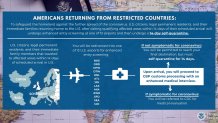Ahead of the nation's 30-day air travel ban expansion from Europe, New Yorkers returned home Monday through John F. Kennedy International Airport.
While the Department of Homeland Security's new process for Americans returning home from certain European countries doesn't necessarily include physical screenings, many passengers were surprised more aren't being done.
"They gave us forms to fill out asking us if we had any experience or contact with anyone diagnosed...after we boarded," Ginger Miller, an overseas student who arrived from London, told NBC New York.
Tracking Coronavirus in Tri-State
According to the DHS's new guidelines, all Americans returning from restricted countries have been required to travel through certain airports, with JFK and Newark being two out of 13. In addition to regular customs, they will then go through "enhanced entry screening."
Travelers at JFK say they were given forms to fill out. The forms asked questions about their recent travel history, like where they've been in the past 14 days, and their medical condition.
we had to fill out a form at customs at JFK indicating whether we had traveled to any hot-spot countries. it also asked for our seat number and address. customs agents didn’t look at the forms and just stacked them up upon entry.
— Blake Paterson (@BlakePater) March 17, 2020
"Every person coming from a plane is going to get two forms and they're called the health forms. You just need to fill it out and you'll give it to people in security. It's part of the border control," overseas student Connyr Lu explained as her mother kneeled down at a JFK parking lot and used disinfectant wipes to clean her daughter's shoes.
Following the questionnaires, the DHS says passengers are given written guidance about the COVID-19 disease before they're directed to their final destination.
One passenger told NBC New York that she got the impression that everyone would get a physical check. "On the paper, it said that they would check the temperature, but there was no temperature check," said Wendy Van Lare, who has also just returned from the UK.
Others took to social media to document their experience. Some said they did have their temperatures check by a Centers for Disease Control and Prevention personnel:
Once travelers return home, they are required to self-quarantine and monitor their health in accordance with CDC best practices, the DHS said. "In order to ensure compliance, local and State public health officials will contact individuals in the days and weeks following their arrival," the agency's guidance continued.
Many travelers across the country have been experiencing long lines at crowded airports since President Donald Trump announced Saturday that the U.S. will broaden its European travel ban, adding Britain and Ireland to its list, and was considering imposing restrictions on travel within the U.S. to areas hit hard by the coronavirus spread.

With the number of cases worldwide topping 181,000, a wave of closures and restrictions appears to keep growing.
While American citizens and green card holders aren't included in the travel ban and are allowed to return home, overseas student Ken Zachara says that he's glad to be home.
"I was supposed to not come back until later in the Spring. Now I’m kind of relieved with all the travel restrictions, I’m glad to not be in Europe anymore," Zachara said.



